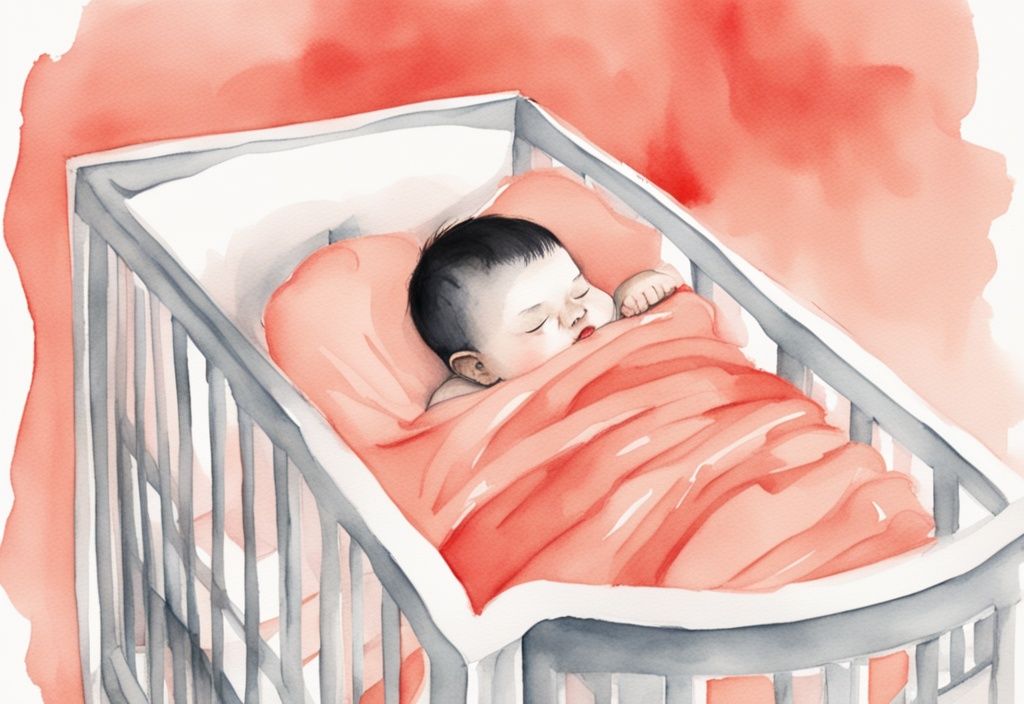Ask any new parent, and you’ll hear, “Don’t wake the baby!” but have you ever wondered why we stand by this golden rule? You’re probably sitting there, cup of coffee in hand, your baby peacefully napping and contemplating whether your urgent need justifies disturbing their precious sleep – “Why should you never wake a sleeping baby?”
Now, let’s journey together through this informative article as we unravel the mystery surrounding your baby’s sleep patterns. We’re going to lift the veil on what happens when your little one’s eyelids flutter shut, the consequences that might follow a sleep interruption, and if there are any moments when it’s okay to wake them. By the end of this article, you’ll proudly carry the essential knowledge needed to contribute positively to your baby’s sleep health, paving the way for them to grow and thrive.
The Role of Sleep in Baby’s Growth and Development
The Crucial Role of Sleep in Baby’s Physical Health
Deep sleep is truly magical for your baby’s growth. It’s during these peaceful slumbers that growth hormones are at their busiest, ensuring that every inch and ounce of your baby grows just right. And let’s not forget the brain—it’s like a sponge soaking up everything it needs for learning and memory.
But wait, there’s more! Good sleep is a superhero for your baby’s immune system, making them strong against those pesky infections and illnesses. A healthy sleep routine also keeps metabolism on track, warding off future issues like obesity and type 2 diabetes. Trust me, you don’t want to mess with their precious sleep!
The Impact of Sleep on Your Baby’s Emotional Well-Being
Sleep isn’t just about physical health; it’s a major player in emotional well-being too. You’ve probably noticed your little one’s sunny mood after a good nap, right? In contrast, a cranky, sleep-deprived baby can be quite the handful.
That’s because proper sleep lowers stress levels and supports overall mental health, helping your baby feel secure and happy. Interrupting this could throw their emotional balance off, making them more prone to stress and irritability. So unless absolutely necessary, let your baby enjoy their well-deserved rest. It’s one of the best things you can do for their overall emotional stability.
The Negative Consequences of Disturbing Your Baby’s Sleep
Ensuring your baby has uninterrupted sleep can greatly impact their overall development and well-being. Let’s explore why should you never wake a sleeping baby by diving into how sleep interruptions can affect their sleep cycle and potential health and behavioral problems that may arise.
How Interrupted Sleep Affects Your Baby’s Sleep Cycle
Babies go through various sleep cycles, with REM sleep playing a crucial role in their brain development. When considering why should you never wake a sleeping baby, it’s essential to grasp that frequent interruptions can significantly disrupt their natural sleep rhythms. Babies need continuous sleep to move smoothly through their sleep stages, which supports overall growth and development.
Interrupting this process can lead to sleep regression, causing a baby who was previously sleeping well to start waking up at night or skipping naps. This disruption can be exhausting for both the baby and the parents, as everyone struggles to get enough restful sleep.
Potential Health and Behavioral Problems Related to Disturbed Sleep
One of the most significant reasons why should you never wake a sleeping baby is the array of health and behavioral problems that can stem from disrupted sleep. First, disturbed sleep can quickly lead to a sleep deficit, making babies over-exhausted and worsening sleep issues. Over time, continuous sleep disruptions during infancy often link to behavioral challenges that appear later in life.
A consistent lack of adequate sleep can also negatively impact a baby’s appetite, hampering their ability to consume the nutrition they need while awake. Moreover, prolonged sleep disturbances can lead to mental health concerns, like elevated stress levels and poorer emotional regulation.
Overall, ensuring that your baby gets uninterrupted sleep is crucial for their physical health, emotional well-being, and cognitive development. Keeping their sleep cycles steady nurtures their growth and keeps them happy and healthy.

Instances When Waking a Sleeping Baby Is Necessary
Understanding when to wake your baby can help foster their growth, normalize sleep patterns, and prevent potential confusion between day and night. Let’s explore some important aspects.
The Relationship Between Baby’s Feeding Schedules and Sleep
Newborns have tiny tummies that can’t hold much, so they need frequent feedings to get the nutrients they need for healthy growth. By gently waking your newborn to feed, you make sure they’re getting enough calories, which is essential for gaining weight and supporting their overall development. Especially in those first few weeks, maintaining a regular feeding schedule is crucial.
Interrupting sleep to feed might feel a bit strange, but it keeps your baby from going too long without nourishment, which is vital during early infancy. Think of it as nudging them awake to ensure they’re fueled up and ready to thrive.
The Importance of Regulating Your Baby’s Sleep to Avoid Day/Night Confusion
In the first 8-12 weeks, babies often struggle to tell day from night. It’s a common issue, but encouraging your baby to wake gently during the day can help set their internal clock correctly. This practice lays the groundwork for better nighttime sleep.
Gently waking your baby during the day helps them establish a consistent sleep schedule, cutting down on long naps that might mess with nighttime rest. This small effort pays off by setting a foundation for healthier sleep habits, making life a bit smoother for both of you.
Key Situations When You Mustn’t Wake a Sleeping Baby
Understanding when to let your baby sleep can significantly impact their growth and well-being. Here are critical situations where waking a sleeping baby should be avoided.
When Your Baby Has Established a Consistent Sleep Routine
Once your baby has settled into a consistent sleep routine, it’s crucial to respect their natural rhythms. Disturbing this routine can lead to sleep disruptions, making it harder to maintain those well-established patterns. Consistent sleep is the cornerstone of stable sleep habits, which ultimately support your baby’s overall well-being.
Stability in sleep routines helps nurture better cognitive and emotional development. Uninterrupted rest is essential for your baby’s growth. Respecting their sleep contributes to a happier, healthier baby who feels secure in their sleep environment.
Why Sleep is Paramount During Your Baby’s Illness
During illness, sleep becomes even more critical for a baby’s recovery. Extra sleep supports the immune system, helping the body fight off infections more effectively. Interrupting this vital rest can slow down the recovery process and prolong the illness. Always consult with a pediatrician to ensure your baby is getting both the necessary rest and adequate nutrition or hydration during times of illness.
Ensuring sufficient sleep helps bolster the body’s natural defenses. This provides your baby with the energy needed for a speedier recovery. Letting them sleep also means they are less cranky and more comfortable, making the healing process smoother for both baby and parents.

Essential Tips for Parents: How to Fulfill Baby’s Sleep Needs
Steps for Determining Your Baby’s Sleep Needs
Figuring out the best sleep schedule for your baby can feel like piecing together a puzzle. Start by paying close attention to when your baby naturally drifts off and wakes up. This helps set those perfect nap and bedtime windows, which are crucial for fostering a consistent routine. Keep in mind that the amount of sleep your baby needs can change as they grow. Newborns typically sleep 14-17 hours a day, while slightly older babies might need a bit less rest. Charting these patterns can offer valuable insights, making sure your little one is well-rested and happy.
Striking a Balance Between Baby’s Sleep and Your Practical Needs
Finding the right balance between your baby’s sleep needs and your daily tasks can sometimes feel like juggling. Sticking to a solid nap schedule is your best ally here, ensuring that essential appointments or chores don’t interfere with your baby’s rest. Plan your day around feeding and sleeping times; this not only guarantees quality sleep for your baby but also helps you manage your day more effectively. Remember, maintaining these schedules with minimal interruptions strengthens good sleep habits. And when it comes to wake time, the rule of thumb is to let a sleeping baby lie, since waking them up can disrupt their sleep quality, vital for their growth and development.
Proven Techniques to Encourage Sound Sleep
Helping your baby get sound sleep can make a world of difference in their daily routines and overall well-being. By establishing predictable patterns and promoting independence in their sleep habits, you’ll see remarkable improvements in their sleep quality.
Establishing a Steady Wake-and-Sleep Routine
A consistent wake-and-sleep routine is foundational in helping your baby’s internal clock adjust to a regular schedule. Regular bedtime and wake-up times create a sense of predictability that is comforting for babies. Develop a calm, pre-sleep ritual, such as a warm bath or reading a soothing bedtime story, to signal that bedtime is approaching. This quiet transition helps to settle your baby down, making it easier for them to associate these activities with falling asleep.
The Role of Self-Soothing Skills in Promoting Sleep
Encouraging self-soothing is essential for fostering independence in your baby’s sleep habits. The wake-and-sleep method can be particularly effective; this involves gently rousing your baby before placing them in their crib, enabling them to learn how to drift back to sleep on their own. Over time, this method helps babies develop the ability to self-soothe without relying on external aids like rocking or nursing. This reduces night awakenings and ensures more restful sleep cycles, aiding in their overall growth and well-being.
Why Should You Never Wake a Sleeping Baby
In conclusion, understanding why you should never wake a sleeping baby unless absolutely necessary is key. Consistent sleep patterns are crucial, as interruptions can lead to long-term sleep disturbances and affect emotional and physical health. Fostering self-soothing habits supports sound sleep, promoting a happier and healthier baby.
Wrapping Up: The Essential Do’s and Don’ts of Waking a Sleeping Baby
Ensuring your baby’s sleep is restful and beneficial requires navigating the fine line between necessary waking and preserving sleep integrity. Let’s dive into why you should never wake a sleeping baby without considering a few crucial aspects:
Always Consider the Context and Individual Needs of Your Baby Before Deciding to Wake Them
Babies have unique sleep patterns and needs that evolve based on their developmental stage, health, and temperament. Before deciding to wake your baby, take a moment to assess the situation. Is the waking necessary for health reasons or a scheduled feeding? Understanding your baby’s unique needs can help prevent unnecessary disruptions. Waking a baby without a valid reason can interfere with their natural sleep cycles and developmental processes.
Understand That Occasional Waking is Sometimes Necessary for Health, Feeding, and Maintaining a Routine
Of course, there are situations where waking your baby is crucial, particularly in their early weeks. Newborns often need to be woken for feedings to ensure they get the nutrition required for growth. Also, gently waking a baby during the day can help reset their circadian rhythm, preventing day/night confusion. Occasionally waking them to maintain a healthy routine can also support overall sleep quality in the long run.

Avoid Habitual Waking to Prevent Long-Term Sleep and Behavioral Issues
Habitually waking a sleeping baby without necessity can lead to long-term sleep problems and behavioral challenges. Over time, consistent disruptions can result in sleep deficits, increased irritability, and difficulty establishing a stable sleep routine. Let your baby find their natural sleep rhythm and only intervene when absolutely necessary. Quality sleep is vital for their emotional and physical well-being, supporting overall growth, immune function, and cognitive development.
In a nutshell, while some scenarios necessitate waking your baby, it’s essential to minimize these interruptions. This approach fosters healthy sleep habits and mitigates potential negative impacts on their development.
FAQ: Your Biggest Questions About Babies and Sleep, Answered
Sleep is a crucial aspect of your baby’s development and well-being. Understanding when and how to manage their sleep can make a significant difference. Below are detailed insights on various sleep-related questions every parent might have.
When is Waking Up a Sleeping Baby Okay?
Sometimes, waking up your sleeping baby is necessary to keep their sleep and feeding routines on track. It’s okay to do this for essential reasons like feedings, correcting day/night confusion, or maintaining a regulated sleep schedule. These moments ensure your baby gets the nutrition and structure they need.
Why Should You Never Wake a Sleeping Baby?
Waking a sleeping baby without a crucial reason can disrupt their sleep cycle and impact their mood and development. Babies need uninterrupted sleep to help with brain development and overall growth. Unnecessary wake-ups can make them cranky and affect their natural sleep patterns.
How Do I Discern If My Baby Needs More Sleep?
To figure out if your baby needs more sleep, look for signs like frequent yawning, rubbing eyes, and fussiness. Also, check if your baby is hitting the recommended sleep milestones for their age. These cues will help you understand if they are getting the rest they need or if they might need adjustments to their sleep schedule.
Techniques for Helping My Baby Adjust to a Sleep Schedule
Adjusting your baby to a sleep schedule involves a bit of routine and a lot of patience! Start with consistent wake-up and bedtime rituals. Gentle waking techniques can ease them into a new routine without too much stress. Keep the pre-sleep environment calm and free from overstimulation. This consistency helps in creating a reliable sleep rhythm for your little one.
Steps to Resolve Day/Night Confusion in Babies
Dealing with day/night confusion? Try exposing your baby to natural light during the daytime and dimming the lights in the evening. This can help their internal clock differentiate between day and night, aiding in smoother sleep patterns. Little by little, you’ll see improvements as your baby begins to understand the difference.
How to Recognize Troublesome Sleep Patterns in Your Baby
Not all sleep disturbances are normal. Be on the lookout for frequent night awakenings, problems settling back to sleep, or very short naps. These could be signals that your baby’s sleep environment or routine needs tweaking. Small changes can often make a big difference in their sleep quality.


